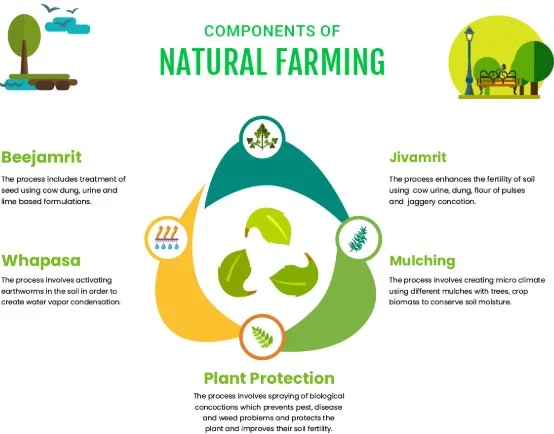Syllabus: GS3/Agriculture
Context
- The rise of natural farming among Shimla’s apple growers marks a transformative shift toward sustainable agriculture.
| Do you know? – Cash Crop: Apple is the dominant fruit crop in Himachal Pradesh and has become the leading cash crop among fruits. 1. It contributes 76% to the region’s total fruit production. – Decrease in Productivity: Poor management practices, over-reliance on chemical fertilisers and pesticides as well as adverse effects of climate change pose serious challenges for Himachal Pradesh’s once-thriving apple industry. – Solution: A promising solution to these challenges lies in natural farming, which focuses on utilising local resources, enhancing soil health and promoting sustainable production practices. |
Natural Farming
- Natural farming is an approach to agriculture that emphasizes working with nature’s processes to grow crops in a sustainable and holistic way.
- It follows local agro-ecological principles rooted in indigenous knowledge, location-specific technologies, and adaptations to local agro-ecology.
- One of the central ideas of natural farming is to minimize reliance on external inputs and create a system that can sustain itself over the long term.

- Key practices of natural farming include:
- Minimal Soil Disturbance;
- Use of Organic Inputs;
- Biodiversity and Polyculture;
- Water Conservation;
- Natural methods to manage pests;
- Synthetic fertilizers, herbicides, and pesticides are avoided.
Natural Vs. Organic Farming
- Natural farming emphasizes minimal intervention with nature, avoiding tilling, fertilizers, and even weeding.
- It focuses on creating self-sustaining ecosystems with little to no external inputs, trusting nature to maintain soil health and manage pests.
- Organic farming follows specific certification standards that prohibit synthetic chemicals and genetically modified organisms (GMOs).
- It allows the use of organic fertilizers, pesticides, and tilling.
- It tends to be more structured and regulated than natural farming.
Natural Farming in Practice
- There are several states practicing Natural Farming. Prominent among them are Andhra Pradesh, Chhattisgarh, Kerala, Gujarat, Himachal Pradesh, Jharkhand, Odisha, Madhya Pradesh, Rajasthan, Uttar Pradesh and Tamil Nadu.

Benefits of Natural Farming
- Environmental Sustainability: It helps protect soil health, reduces pollution, and supports biodiversity.
- Resilience to Climate Change: Natural farming promotes agricultural practices that can adapt to changing climates, such as drought-tolerant crops and sustainable water use.
- Healthier Food: Food produced without chemical fertilizers and pesticides is considered safer and more nutritious.
- Economic Benefits: Over time, natural farming can reduce costs related to chemical inputs and increase the resilience of farms, potentially leading to higher yields.
Challenges
- Learning Local Ecosystem: It requires a deep understanding of local ecosystems, which can take time to learn and apply effectively.
- Labor-Intensive: In the transition period, natural farming is more labor-intensive and initially produces lower yields compared to conventional farming.
- Market Demand: Although organic products are gaining popularity, natural farming does not always meet mainstream market expectations or certification standards.
Government Initiatives
- Pradhan Mantri Krishi Sinchayee Yojana (PMKSY): The promotion of drip and sprinkler irrigation systems under this program can be adapted to natural farming practices.
- National Mission on Natural Farming (NMNF): The Union Cabinet announced the NMNF as a standalone Centre-sponsored scheme under the Ministry of Agriculture & Farmers’ Welfare.
- It aims to promote natural farming among one-crore farmers across the country.
- It will be implemented in 15,000 clusters in Gram Panchayats, covering approximately 1 crore willing farmers.
- Soil Health Card Scheme: Launched in 2015, this initiative provides farmers with soil health cards that offer detailed information about the nutrient content and pH levels of their soil.
- National Mission on Sustainable Agriculture (NMSA): Launched in 2014, encourages the adoption of sustainable farming techniques, including natural farming, to improve soil health, conserve water, and enhance productivity.
- National Organic Farming Research Institute (NOFRI): It focuses on improving soil health, developing organic farming technologies, and promoting sustainable agricultural practices.
- States Practicing: There are several states practicing Natural Farming.
- Prominent among them are Andhra Pradesh, Himachal Pradesh, Gujarat, Kerala, Jharkhand, Odisha, Madhya Pradesh, Rajasthan, Uttar Pradesh and Tamil Nadu.
Way Ahead
- The Government is increasingly recognizing the importance of natural farming in addressing environmental challenges, improving farmer incomes, and ensuring food security.
- These efforts, when combined with local farmer participation and state-level innovation, hold great promise for the future of sustainable agriculture in India.
Source: DTE
Previous article
News In Short 28-12-2024
Next article
India’s Diplomatic Engagements